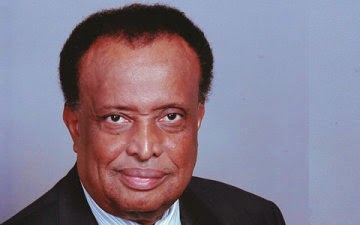Nigeria's problems started in 1914 - Walter Carrington

A former United States of America ambassador to Nigeria, Walter Carrington, in this interview with BAYO AKINLOYE, says Nigeria will face major instability if it fails to conduct free and fair elections in 2015 and that President Goodluck Jonathan should have visited Chibok to show the world that he is a fearless leader.
Did you know? You can comment on this post! Just scroll down
Do you think Nigeria is practising true democracy at the moment?
I am not sure what you mean by ‘true’ democracy. Democracy is dependent on regular free and fair elections which reflect the will of the people. It is those who are elected and not the people themselves who vote on the laws by which the citizens will be governed. If the people are dissatisfied with the actions of their elected representatives, they can remove them at the next election. A representative democracy requires that the government respects freedom of speech, a free press and an independent judiciary...
Nonetheless, would you agree that the current democratic government is better than military rule?
Civilian rule, no matter its flaws, is always superior to the iron-fisted rule of the military in which the citizens have no voice. The people will get a chance to render a verdict as to how satisfied they are with the current government in next year’s elections. These must be seen to be transparent and honest.You were part of the struggle against General Sani Abacha’s rule. What many found curious is the fact that you were an American ambassador to the country and weren’t expected to be partisan in the political affairs of Nigeria. Why was your case different?
I would agree that an ambassador serving in a country where there is a functioning political system ought not to take sides between political parties. However, during my four years in Nigeria, there was no such system. Abacha had banned political parties. There was no legislature to reflect the will of the people. Several newspapers were closed and journalists were harassed and imprisoned. The country was under military dictatorship. Human rights were regularly trampled upon. I have since my student days been active in promoting human rights. I first came to Africa in 1952 as an American delegate to an international youth conference in Senegal. I was representing America’s leading civil rights organisation, The National Association for the Advancement of Coloured People. I met many young Africans and Asians who would become active in their countries’ struggles for independence. I joined them in supporting resolutions calling for the ending of colonial rule. I spent ten years working in African countries directing programmes for the Peace Corps. I was dismayed at how detached many diplomats from a lot of countries were from the people of the nations in which they served. I was inspired by a speech by Robert F. Kennedy in which he argued that ambassadors are not only the representatives of the President of the United States to the governments to which they are accredited but that they also are the representatives of the people of the United States to the people of the country in which they serve. When I observed the human rights of the citizens of Nigeria being abridged in circumstances where, if they raised their voice in protest, they risked being imprisoned or killed, I simply could not remain silent. I felt that I had a moral duty to speak out.
In an interview with SUNDAY PUNCH, a former US Ambassador to Nigeria, Mr. John Campbell insisted that Nigeria is moving toward a breaking point unless its citizens take a drastic step to halt its descent into disintegration. What’s your view?
Much will depend on next year’s elections and whether they are free and fair and whether their outcome represents the true will of the Nigerian people. If not, then I think the country is in for a period of serious instability. Whichever party wins must be dedicated in deeds, not merely in words, to cure the corruption which has infected much of the polity. Only then will Nigeria be able to realise its vast potential. It is crucial that those on the periphery believe that those in power at the centre have the well-being of all Nigerians at heart, not just their own financial enrichment. A concerned centre can hold the country together. Things need not fall apart.
Looking at the corruption level attributed to Abacha’s regime, compared with what we see today in the country, will you say there’s been some improvement?
It is obvious that much still remains to be done. There is, however, more transparency and freedom for the press and civil society organisations to call those who misbehave to task. The problem is that there is still too much impunity enjoyed by those with favoured political connections.
A lot of people and governments see Nigeria as an extraordinary country with great potentials but beset by unending, debilitating crises. Where would you say things went wrong?
It began a hundred years ago (1914) when Lord Lugard, with no regard for the different cultural traditions of the people who inhabited the territories, amalgamated the North and South into one administrative unit to which his wife gave the name, Nigeria. What is remarkable, however, is how well this country, made up of over 250 different ethnic groups, speaking around 500 separate languages, has held together for a century, despite a bloody civil war and a half-dozen successful military coups. Nigeria is the largest and one of the very few countries of any size whose population is nearly evenly divided between Christians and Muslims. Yet, in spite of provocations by groups like Boko Haram and local bloody conflicts in Plateau State, the country has done much better in accommodating religious differences than any other sharing many descendants of the two Abrahamic faiths.During turbulent times, many of your best and brightest left for foreign shores where they have excelled and have been admired as among the most accomplished of émigrés. Yet their opportunities to replicate their successes back home have been severely constricted. They, along with highly educated Nigerians who remained home, have found their chances to succeed in business or politics greatly compromised by their reluctance to go along with a corrupt system. Merit needs to be seen to be more rewarded than it is today. All capable hands must feel welcome on deck
Article Posted 5 Years ago. You can post your own articles and it will be published for free.
No Registration is required! But we review before publishing! Click here to get started
One Favour Please! Subscribe To Our YouTube Channel!
468k
Cook Amazing Nigerian Dishes, Follow Adorable Kitchen YouTube Channel!
1.1m
Like us on Facebook, Follow on Twitter
React and Comment
Click Here To Hide More Posts Like This
Watch and Download Free Mobile Movies, Read entertainment news and reports, Download music and Upload your own For FREE.
Submit Your Content to be published for you FREE! We thrive on user-submitted content!
But we moderate!


















